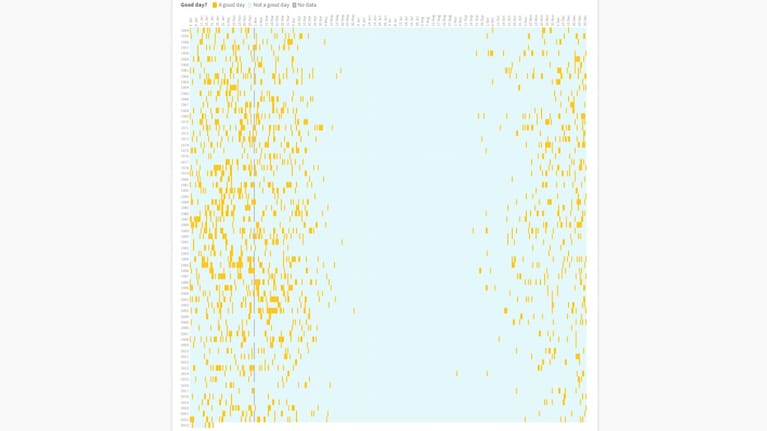"You can't beat Wellington on a good day" is an ironic adage echoed far and wide by residents of the capital, but a new data analysis suggests that "good days" may be hard to find in the first place.
By Devin Pike
The visualisation, created by analyst James Mulrennan on Twitter, was inspired by recent talk of good weather in the region and the slogan's popularity.
"[I saw] a tweet from a mutual [friend] saying they couldn't remember a run of good days like we've had this week," he told 1News.
He gathered NIWA climate data of the region dating back to January 1, 1954 and announced through a tweet that only 7% of days in Wellington have ever been good, let alone unbeatable.
That is only 1839 days, or just over five years, of unbeatable Wellington skies across 69 years.
For the sake of the investigation, a "good day" was defined as a day where the temperature rose above 18C, rain was less than 0.5mm, average wind speeds were below 15km/h and more than 75% of daylight hours were sunny.
By this definition there is a yearly average of 26 good days in Wellington, the year 1971 having the most at 46.
"[It was] very much [a] vibes-based analysis, [I] thought about what the last few days (which felt "good" to me) were like, then went from there," he said.
Reactions to the "half-joking" research were largely positive on Twitter, though some critiqued the lack of a "too hot" parameter.
As a Wellingtonian originally from Auckland, Mulrennan opposed the idea as heat was "never really a problem" for him in the capital.
He did, however, note in response to one comment, that the percentage of good days rises to 10% if the wind is ignored and 14% if locals don't mind cold temperatures.

Mulrennan also warns that a change in NIWA's data gathering methods in 2004 may have skewed wind readings, causing fewer good days to register within the past two decades.
Nonetheless, he still accounted for the city's signature gusts as "a break from the wind is the defining feature of a 'good day' to me".
Mulrennan has no predictions for good days to come, saying that he'll leave them to the experts who are "used to taking flack" when forecasts are wrong.



















SHARE ME